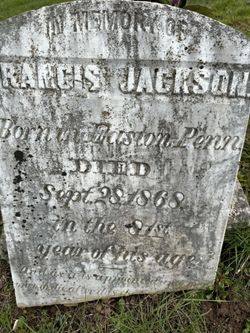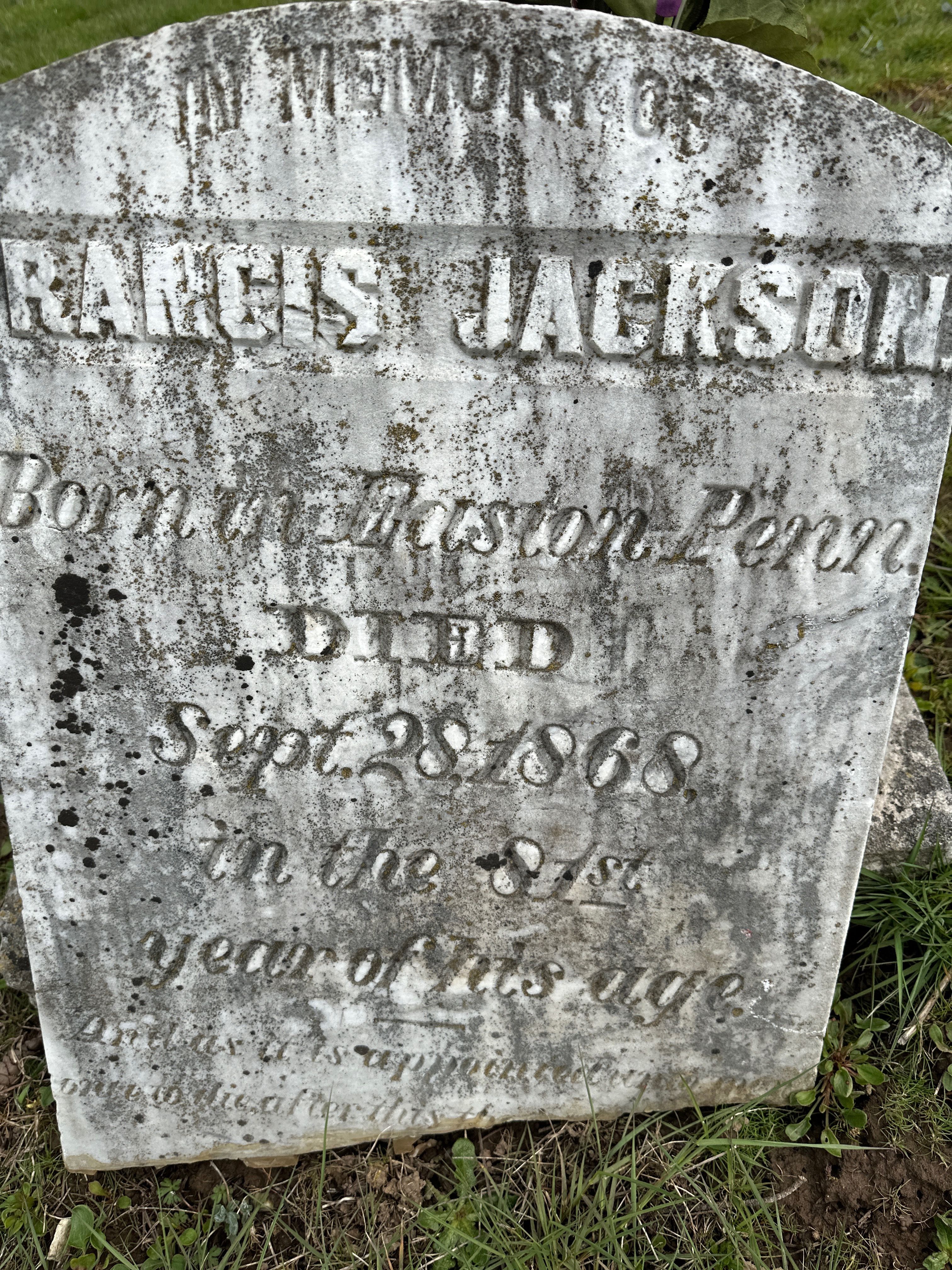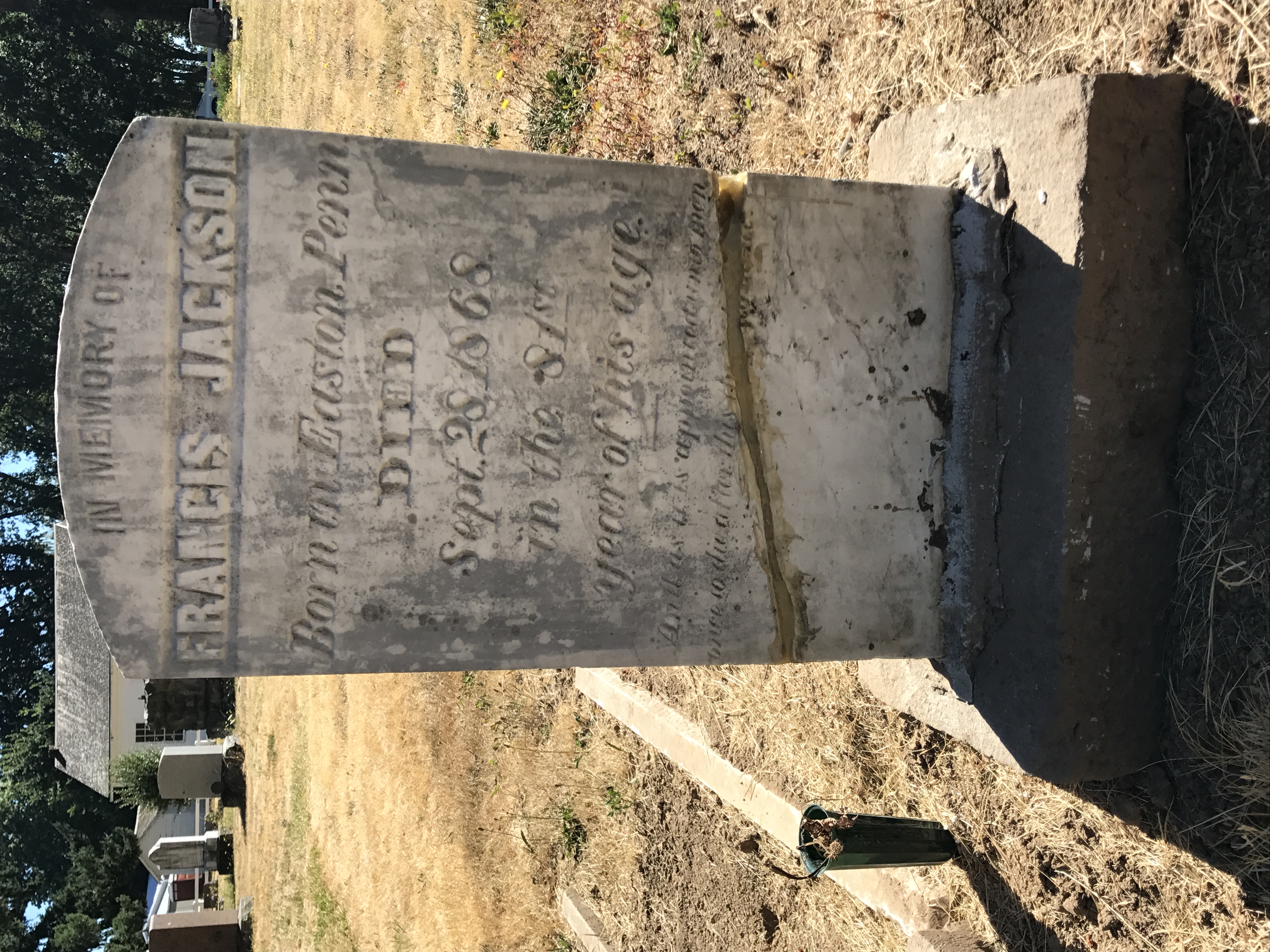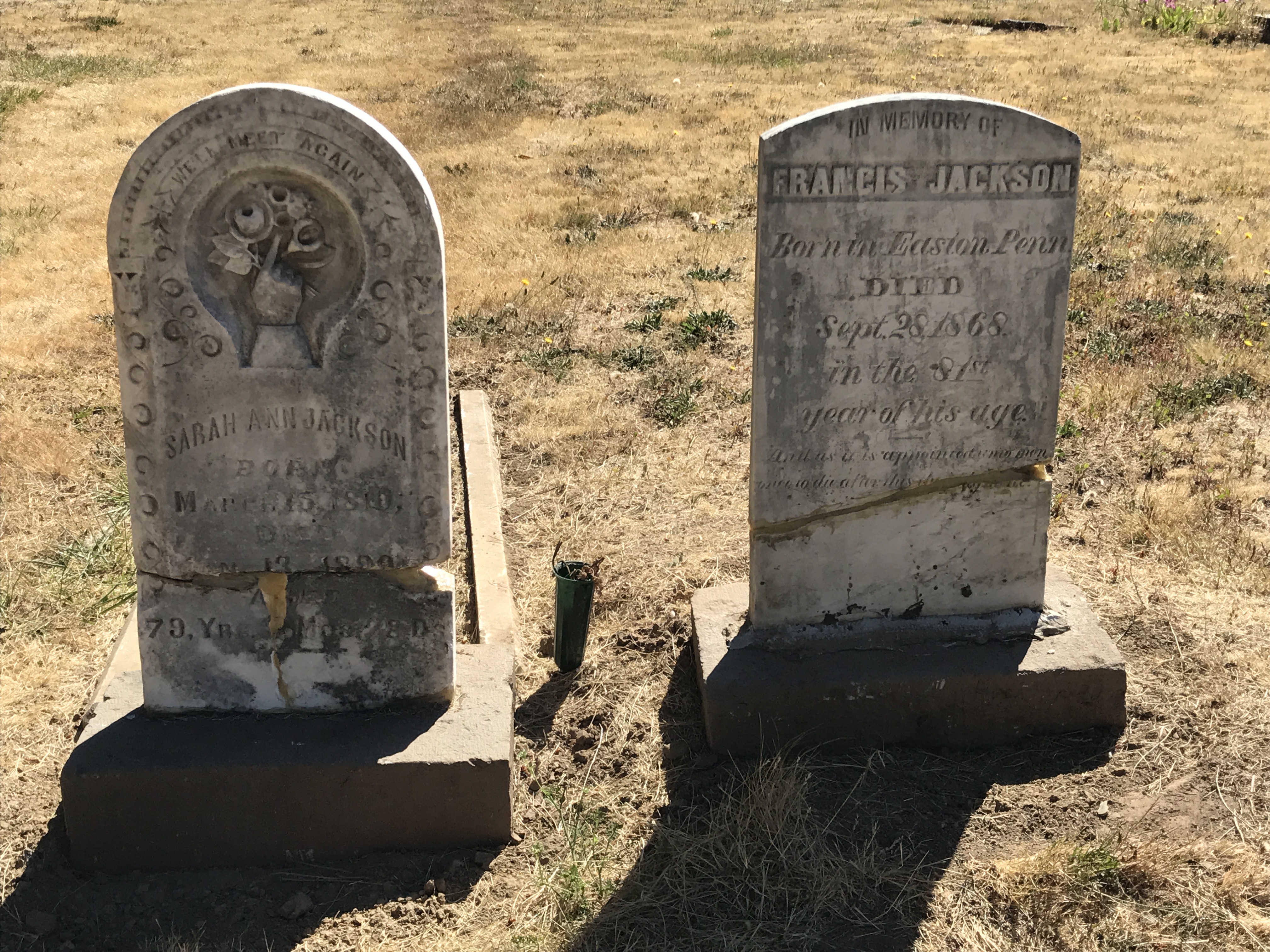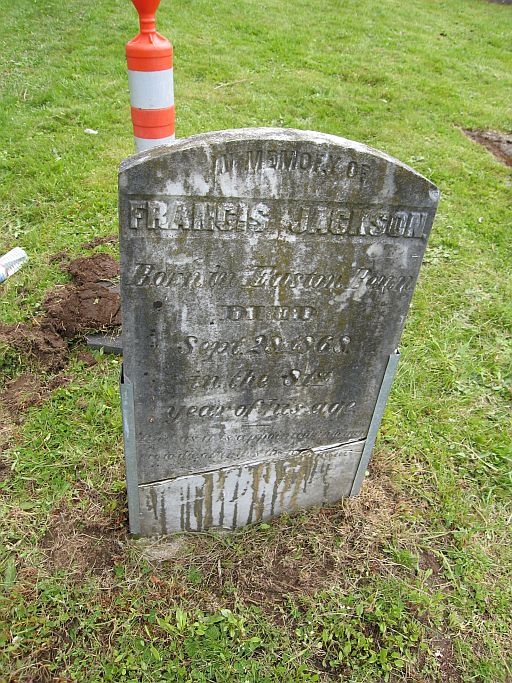One may view the essence of the Pioneer Craftsman, Francis Jackson, when they gaze upon his handcrafted spool. Beds displayed at the McLoughlin house and Rose Farm in Oregon City, Oregon.
A talented carpenter, Jackson produced articles from boards sawed from logs cut from his own trees on his donation land claim near Liberal, OR. There on the banks of a creek, he turned out beds, chairs, tables and other articles of furniture using a water-powered lathe. His aritistic talent comprised designs he came to know when he was an apprentice in Pennsylvania.
Samples of his fine craftsmanship are scattered amoung his descendants and are on display in museums. Although they are not so famous as the furniture made at the Aurora Colony, they show a skill and a delicacy of design.
Francis Jackson was born in Easton, Pennsylvania, in 1787, the son of an importer of European goods. When he was an adolescent, his father left home on what was to be a routine buying trip to England. The father never returned and some thought he might have been swept overboard on the voyage, while others suggested he had deserted his family.
Mrs. Jackson took her plight in hand and signed Francis as an apprentice to a funiture maker. The boy worked hard until he was discharged as a master cabinet maker. By that time the War of 1812 had begun. Francis enlisted serving as a sharp-shooter under Captain Horne.
After his stint in the War he set up his own business and married. The business prospered and the marriage was blessed with many sons. The sons grew rapidly and were not content to settle down in the quiet Delaware town of their parents when stories reached their ears of a new western frontier ripe fo the taming. They pleaded with their parents to go west with them as pioneers on the Oregon Trail.
But their Mother was ailing, and Francis told the boys, "No, sons, you are young, you are free to go. I'll stay at home and carry on the business." The four oldest boys - Thomas, Andrew, George and Ben arrived in Oregon with the Immigration of 1845.
A few years after the boys left, Mrs. Jackson died and there was no reason for Francis not to travel west. He picked his hammers, saws, augers, files, drawknives, and a foot powered lathe. With his fifteen year old son, Henry, he traveled the long sea voyage around the horn.
They arrived in Portland early in 1852, where Francis had his tools loaded onto a river steamer bound for Oregon City, Oregon. Francis was now 65 years old, and age when most would retire. But he was robust and the territory was booming. Sawmills at Oregon City were truning out fir boards, cedar shakes and shingles for the California trade and for local buildings. The furniture maker was accustomed to working with the fine grain and silky texture of hardwood and would have none of the available lumber. He began traveling about the country looking for land with hard wood trees. He located a prime spot east of the Willamette on level prairie where the Mollala Indians raced their ponies and hunted game. White oak grew grew in stately groups and the maples were huge. He hurried to Oregon City to register his claim. (ct. # 1366) at the land office and then back to put up a cabin before the fall rains began.
Arriving in the migration of 1852, was Sarah Ann Cambell Morris, who had been widowed on the Trail by Cholera Scourge with took a heavy toll on the pioneers crossing the plains that year. In addition to her husband, John, Sarah lost two little girls somewhere in what is now Nebraska. There was no turning back, so Sarah Ann and the other children continued on to Oregon City.
Not much is known of the background of John Morris. Sarah Ann's people were The Campbells of Camden, New Jersey, and her brother Joseph was experimenting with a concentrated tomato soup and pork and beans to be preserved in cans. he had tried to persuade his brother (John) but John was a farmer and had a homestead.
Tales of Oregon were going the rounds and Sarah Ann listened to the enthusiastic stories John brought home from every trip to town. "There're sections of free land out in Oregon, Sarah, room for all the young ones to have a farm a piece when they are old enough. Besides, Indiana is filling up too fast. You can't swing a cat without getting across a fence." The trip, that began so happily, proved to be a tragedy for the Morris family.
But, the women of the west were strong, upon arrival in Oregon City, Sarah Ann went claim hunting. It happened that land south of Oregon City was still available. She filed and moved out with her entourage that included a prairie schooner and eight children.
Jackson descendents relate the heart-warming story of a lonely widow and widower. It wasn't long before Jackson, still hearty and robust, though white of hair and beard, went calling on the widow. "I come to pay my respects, Mrs. Morris." He introduced himself "since we are neighbors."
"That's kind of you, Mr. Jackson," said the tiny woman, while the children regarded the caller with curiosity ."If there's anything I can do to help, feel free to send one of the boys over," Jackson said. I'm alone myself, except for Henry. I know what it is like to lose your mate." Jackson raised his hat politely as he gave a final appraisal of the neat figure with rosy cheeks and bright blue eyes, whose skirts were tucked up under her apron to keep them off the ground while she worked on the camp she was trying to make.
Not a week had gone by before Jackson was back at the Morris camp. Thoughts had been crossing his mind. "I'm a blunt man, Mrs. Morris," He began. "And I don't believe in beating about the bush."
"You're alone - ah-h, no mam that is, I'm alone. My cabin is raised and you and the children can't live like this through the winter. I can easily add on another room, we can get married and you can move in with us."
Sarah Ann's mouth fell open as she gasped, "but John's not been gone six months. It wouldn't be respectful of his memory to marry so soon." Jackson said, "You can respect his as long as you want. I have my memories too. We're down to hard practical facts, now." Sarah replied "Let me think about it a little." He took her hard worked hand but she pulled away. "No not yet. Come back next week.
Jackson returned to his cabin and began to whistle as he reached for his tools and started to smooth a board he had sawed from a log. "Romantic old fool." He said to himself. "Here your are, almost old enough to be her father anyhow, a woman like her needs a man, and goodness knows, I'm lonely myself."
Sarah Ann's answer when she returned was a firm "yes." I know John wouldn't want me struggling here alone, and the children need a father. And she added, "I promise to be a good wife to you."
They were married in 1853 and, the next year a son named John B. was born to them. With a wife to keep house and direct the boys in the farm work, Jackson was free to build his factory. Little John B. was the delight of his elderly Father, and for him he made some special pieces; a cradle, a high-chair, and a trundle bed. Often a casket has to be made in a hurray, and John B. would hold a candle while Francis finished one at night. He became the delight of his father in his old age. Jackson died in 1868.
The children of Francis and Mary C. Miller Jackson were: William (b. 1818), Thomas P. (b. 1819, m. Ann), Benjamin B. (b. 1821 m. Nancy), Ann Elizabeth (b. 1822), Andrew (b. 1824 m. Mary Ingle), George W. (b. 1825, m. Caroline Halpruner), James A. (b. 1828), Mary C. (b.1832), Elizabeth )b. 1835), Henry (b. 1837, m. A. Margaret Waite), Francis M. (b. 1838) and Frank (b. 1839).
One may view the essence of the Pioneer Craftsman, Francis Jackson, when they gaze upon his handcrafted spool. Beds displayed at the McLoughlin house and Rose Farm in Oregon City, Oregon.
A talented carpenter, Jackson produced articles from boards sawed from logs cut from his own trees on his donation land claim near Liberal, OR. There on the banks of a creek, he turned out beds, chairs, tables and other articles of furniture using a water-powered lathe. His aritistic talent comprised designs he came to know when he was an apprentice in Pennsylvania.
Samples of his fine craftsmanship are scattered amoung his descendants and are on display in museums. Although they are not so famous as the furniture made at the Aurora Colony, they show a skill and a delicacy of design.
Francis Jackson was born in Easton, Pennsylvania, in 1787, the son of an importer of European goods. When he was an adolescent, his father left home on what was to be a routine buying trip to England. The father never returned and some thought he might have been swept overboard on the voyage, while others suggested he had deserted his family.
Mrs. Jackson took her plight in hand and signed Francis as an apprentice to a funiture maker. The boy worked hard until he was discharged as a master cabinet maker. By that time the War of 1812 had begun. Francis enlisted serving as a sharp-shooter under Captain Horne.
After his stint in the War he set up his own business and married. The business prospered and the marriage was blessed with many sons. The sons grew rapidly and were not content to settle down in the quiet Delaware town of their parents when stories reached their ears of a new western frontier ripe fo the taming. They pleaded with their parents to go west with them as pioneers on the Oregon Trail.
But their Mother was ailing, and Francis told the boys, "No, sons, you are young, you are free to go. I'll stay at home and carry on the business." The four oldest boys - Thomas, Andrew, George and Ben arrived in Oregon with the Immigration of 1845.
A few years after the boys left, Mrs. Jackson died and there was no reason for Francis not to travel west. He picked his hammers, saws, augers, files, drawknives, and a foot powered lathe. With his fifteen year old son, Henry, he traveled the long sea voyage around the horn.
They arrived in Portland early in 1852, where Francis had his tools loaded onto a river steamer bound for Oregon City, Oregon. Francis was now 65 years old, and age when most would retire. But he was robust and the territory was booming. Sawmills at Oregon City were truning out fir boards, cedar shakes and shingles for the California trade and for local buildings. The furniture maker was accustomed to working with the fine grain and silky texture of hardwood and would have none of the available lumber. He began traveling about the country looking for land with hard wood trees. He located a prime spot east of the Willamette on level prairie where the Mollala Indians raced their ponies and hunted game. White oak grew grew in stately groups and the maples were huge. He hurried to Oregon City to register his claim. (ct. # 1366) at the land office and then back to put up a cabin before the fall rains began.
Arriving in the migration of 1852, was Sarah Ann Cambell Morris, who had been widowed on the Trail by Cholera Scourge with took a heavy toll on the pioneers crossing the plains that year. In addition to her husband, John, Sarah lost two little girls somewhere in what is now Nebraska. There was no turning back, so Sarah Ann and the other children continued on to Oregon City.
Not much is known of the background of John Morris. Sarah Ann's people were The Campbells of Camden, New Jersey, and her brother Joseph was experimenting with a concentrated tomato soup and pork and beans to be preserved in cans. he had tried to persuade his brother (John) but John was a farmer and had a homestead.
Tales of Oregon were going the rounds and Sarah Ann listened to the enthusiastic stories John brought home from every trip to town. "There're sections of free land out in Oregon, Sarah, room for all the young ones to have a farm a piece when they are old enough. Besides, Indiana is filling up too fast. You can't swing a cat without getting across a fence." The trip, that began so happily, proved to be a tragedy for the Morris family.
But, the women of the west were strong, upon arrival in Oregon City, Sarah Ann went claim hunting. It happened that land south of Oregon City was still available. She filed and moved out with her entourage that included a prairie schooner and eight children.
Jackson descendents relate the heart-warming story of a lonely widow and widower. It wasn't long before Jackson, still hearty and robust, though white of hair and beard, went calling on the widow. "I come to pay my respects, Mrs. Morris." He introduced himself "since we are neighbors."
"That's kind of you, Mr. Jackson," said the tiny woman, while the children regarded the caller with curiosity ."If there's anything I can do to help, feel free to send one of the boys over," Jackson said. I'm alone myself, except for Henry. I know what it is like to lose your mate." Jackson raised his hat politely as he gave a final appraisal of the neat figure with rosy cheeks and bright blue eyes, whose skirts were tucked up under her apron to keep them off the ground while she worked on the camp she was trying to make.
Not a week had gone by before Jackson was back at the Morris camp. Thoughts had been crossing his mind. "I'm a blunt man, Mrs. Morris," He began. "And I don't believe in beating about the bush."
"You're alone - ah-h, no mam that is, I'm alone. My cabin is raised and you and the children can't live like this through the winter. I can easily add on another room, we can get married and you can move in with us."
Sarah Ann's mouth fell open as she gasped, "but John's not been gone six months. It wouldn't be respectful of his memory to marry so soon." Jackson said, "You can respect his as long as you want. I have my memories too. We're down to hard practical facts, now." Sarah replied "Let me think about it a little." He took her hard worked hand but she pulled away. "No not yet. Come back next week.
Jackson returned to his cabin and began to whistle as he reached for his tools and started to smooth a board he had sawed from a log. "Romantic old fool." He said to himself. "Here your are, almost old enough to be her father anyhow, a woman like her needs a man, and goodness knows, I'm lonely myself."
Sarah Ann's answer when she returned was a firm "yes." I know John wouldn't want me struggling here alone, and the children need a father. And she added, "I promise to be a good wife to you."
They were married in 1853 and, the next year a son named John B. was born to them. With a wife to keep house and direct the boys in the farm work, Jackson was free to build his factory. Little John B. was the delight of his elderly Father, and for him he made some special pieces; a cradle, a high-chair, and a trundle bed. Often a casket has to be made in a hurray, and John B. would hold a candle while Francis finished one at night. He became the delight of his father in his old age. Jackson died in 1868.
The children of Francis and Mary C. Miller Jackson were: William (b. 1818), Thomas P. (b. 1819, m. Ann), Benjamin B. (b. 1821 m. Nancy), Ann Elizabeth (b. 1822), Andrew (b. 1824 m. Mary Ingle), George W. (b. 1825, m. Caroline Halpruner), James A. (b. 1828), Mary C. (b.1832), Elizabeth )b. 1835), Henry (b. 1837, m. A. Margaret Waite), Francis M. (b. 1838) and Frank (b. 1839).
Inscription
IN MEMORY OF
FRANCIS JACKSON
Born in Easton, Penn.
DIED
Sept. 28, 1868.
in the 81st
year of his age.
And as it is appointed unto men
once to die after this the judgment.
Gravesite Details
Reinterred July 7, 1953 Rock Creek Cemetery beside his wife
Family Members
Advertisement
Records on Ancestry
Sponsored by Ancestry
Advertisement
